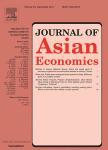版权所有:内蒙古大学图书馆 技术提供:维普资讯• 智图
内蒙古自治区呼和浩特市赛罕区大学西街235号 邮编: 010021

作者机构:School of Finance Zhejiang Gongshang University Hangzhou 310018 China Economic Forecasting and Policy Simulation Laboratory Zhejiang Gongshang University Hangzhou 310018 China Collaborative Innovation Center of Statistical Data Engineering Technology & Application Zhejiang Gongshang University Hangzhou 310018 China Inamori Business School Zhejiang Gongshang University Hangzhou 310018 China
出 版 物:《Journal of Asian Economics》 (J. Asian Econ.)
年 卷 期:2025年第100卷
基 金:Natural Science Foundation of Zhejiang Province, ZJNSF, (LY22G030008, LMS25G030003) Natural Science Foundation of Zhejiang Province, ZJNSF Zhejiang Gongshang University, ZJSU, (SZJ2022B002) Zhejiang Gongshang University, ZJSU
主 题:Banking credit DID International capital flows MPPs
摘 要:This study examines the impact of cross-border capital flow-oriented macro-prudential policies (MPPs) on banking credit dynamics through a quasi-natural experiment encompassing 110 countries from 2000 to 2020. The findings reveal that MPPs significantly mitigate banking credit growth, with more pronounced effects during the post-financial-crisis period. These policies act through commodity prices and exchange rate movements by tempering capital inflows, thereby reducing excessive credit expansion and curbing systemic financial risks. The efficacy of MPPs is critically shaped by regulatory frameworks, the degree of economic liberalization, and the concentration dynamics within banking sectors, collectively underscoring the indispensable role of institutional robustness and competitive market mechanisms in policy implementation. Furthermore, the study uncovers an asymmetrical policy impact, with MPPs demonstrating enhanced efficacy in countries characterized by more advanced financial development. These results have significant policy implications, emphasizing the strategic value of targeted macro-prudential measures in three crucial areas: stabilizing credit cycles, enhancing financial system resilience, and preventing the cross-border contagion of financial vulnerabilities.